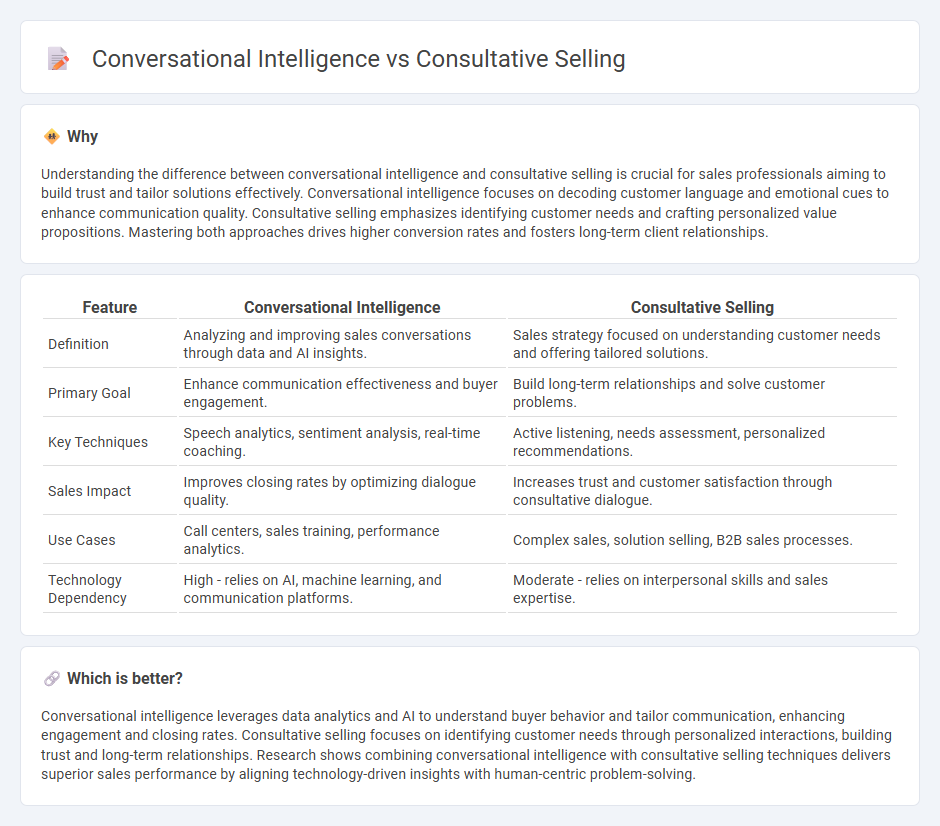
Conversational intelligence enhances sales interactions by leveraging data-driven insights to understand client needs and build trust through authentic communication. Consultative selling focuses on identifying customer challenges and offering tailored solutions that create long-term value and stronger partnerships. Discover how integrating conversational intelligence can transform your consultative selling strategy for greater success.
Why it is important
Understanding the difference between conversational intelligence and consultative selling is crucial for sales professionals aiming to build trust and tailor solutions effectively. Conversational intelligence focuses on decoding customer language and emotional cues to enhance communication quality. Consultative selling emphasizes identifying customer needs and crafting personalized value propositions. Mastering both approaches drives higher conversion rates and fosters long-term client relationships.
Comparison Table
| Feature | Conversational Intelligence | Consultative Selling |
|---|---|---|
| Definition | Analyzing and improving sales conversations through data and AI insights. | Sales strategy focused on understanding customer needs and offering tailored solutions. |
| Primary Goal | Enhance communication effectiveness and buyer engagement. | Build long-term relationships and solve customer problems. |
| Key Techniques | Speech analytics, sentiment analysis, real-time coaching. | Active listening, needs assessment, personalized recommendations. |
| Sales Impact | Improves closing rates by optimizing dialogue quality. | Increases trust and customer satisfaction through consultative dialogue. |
| Use Cases | Call centers, sales training, performance analytics. | Complex sales, solution selling, B2B sales processes. |
| Technology Dependency | High - relies on AI, machine learning, and communication platforms. | Moderate - relies on interpersonal skills and sales expertise. |
Which is better?
Conversational intelligence leverages data analytics and AI to understand buyer behavior and tailor communication, enhancing engagement and closing rates. Consultative selling focuses on identifying customer needs through personalized interactions, building trust and long-term relationships. Research shows combining conversational intelligence with consultative selling techniques delivers superior sales performance by aligning technology-driven insights with human-centric problem-solving.
Connection
Conversational intelligence enhances consultative selling by enabling sales professionals to better understand client needs through active listening, empathy, and strategic questioning. This approach fosters deeper trust and collaboration, leading to customized solutions that address specific business challenges. Leveraging conversational intelligence tools improves communication effectiveness, ultimately increasing sales success and customer satisfaction.
Key Terms
Consultative Selling:
Consultative selling emphasizes understanding clients' needs through in-depth questioning and tailored solutions, fostering long-term relationships and trust. This approach leverages active listening and problem-solving skills to align products or services with specific customer challenges. Explore more about how consultative selling enhances customer engagement and drives business growth.
Needs Analysis
Consultative selling centers on in-depth needs analysis by identifying customer pain points and tailoring solutions that align with their objectives, enhancing the sales process' effectiveness. Conversational intelligence emphasizes decoding verbal and non-verbal cues during sales interactions to adjust strategies in real-time for better customer engagement. Explore how integrating these approaches can elevate your sales performance and deepen client relationships.
Solution Development
Consultative selling emphasizes deeply understanding customer needs to tailor solutions that address specific pain points, using probing questions and active listening to build trust and align offerings. Conversational intelligence focuses on decoding verbal and non-verbal cues during interactions to enhance communication effectiveness, facilitating rapport and influencing decision-making. Explore how integrating both strategies can drive more effective solution development and customer engagement.
Source and External Links
Consultative selling: Building trust and driving success - Simon-Kucher - Consultative selling is a customer-focused sales approach emphasizing active listening and understanding decision-makers' needs to provide tailored solutions and build long-term relationships rather than pushing quick sales.
What Is Consultative Selling? - RAIN Group Sales Training - Consultative selling centers on understanding buyer needs through empathy and incisive questions, aiming to redefine needs and create compelling solutions to build trust and close deals faster.
4 principles of the consultative sales approach - Zendesk - This approach involves acting as an adviser, focusing on customer pain points, actively listening, asking questions, and providing helpful solutions rather than product pushes, especially effective when buyers have researched but need guidance choosing.
 dowidth.com
dowidth.com